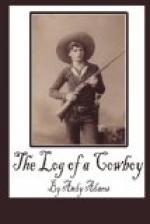On reaching the horse stock, we succeeded in catching a sleepy old horse belonging to Rod Wheat’s mount, and I rode him bridleless and bareback to camp. We received an ovation on our arrival, the recovery of the saddle horses being a secondary matter compared to the buffalo veal. “So it was buffalo that scared our horses, was it, and ran them out of camp?” said McCann, as he helped to unlash the calf. “Well, it’s an ill wind that blows nobody good.” There was no particular loss of time, for the herd had grazed away on our course several miles, and after changing our mounts we overtook the herd with the news that not only the horses had been found, but that there was fresh meat in camp—and buffalo veal at that! The other men out horse hunting, seeing the cattle strung out in traveling shape, soon returned to their places beside the trailing herd.
We held a due northward course, which we figured ought to carry us past and at least thirty miles to the westward of the big Indian encampment. The worst thing with which we had now to contend was the weather, it having rained more or less during the past day and night, or ever since we had crossed the Salt Fork. The weather had thrown the outfit into such a gloomy mood that they would scarcely speak to or answer each other. This gloomy feeling had been growing on us for several days, and it was even believed secretly that our foreman didn’t know where he was; that the outfit was drifting and as good as lost. About noon of the third day, the weather continuing wet with cold nights, and with no abatement of the general gloom, our men on point noticed smoke arising directly ahead on our course, in a little valley through which ran a nice stream of water. When Flood’s attention was directed to the smoke, he rode forward to ascertain the cause, and returned worse baffled than I ever saw him.




